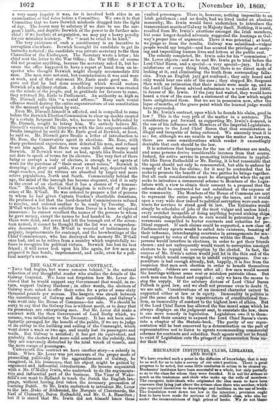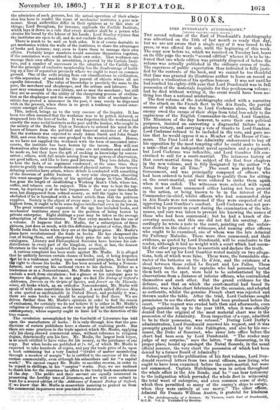MECHANICS' INSTITUTES, CLUBS, LIBRARIES, AND BOOKS. .
WE have reached such a pointin the diffusion of knowledge, that it may be as well for us to take a survey of ddr edict position. There is great progress to be noted; but somelittle Confusion-in action to be cleared up. Mechanics' institutes have been stems-sterna a whole, hut. only partially so as to the mass for whom they were founded. It is not the artisan so much as the tradesman and clerk who make up the rolls of members. The energetic individuals who originated the idea seem to have been unaware that lying just above the artisan class there was another, which also required incentives to knowledge and facilities in the use of hooka. The foundation went down too low in the intention; provision ought first to have been made for sections of the middle elass, who also lay under the inconveniences of high prices of books. W0 do not blame
the admission of such persons, but the actual operation of their admis- sion has been to render the name of mechanics' institutes a pure mis- nomer. Great authorities differ in their opinions as to this state of things; Lord Brougham, for instance, applauds the Carlisle Institute, which lays it demi as a rule that every member 'shall be a person who obtains his bread by the labour of his hands ; Lord Stanley rejoices that the institutes are open to all, and do not exclude the artisan.
There is much to be said on both sides. It is of course desirable to get mechanics within the walls of the institutes, to share the advantages of books and lectures; nay, even to leave them to manage their own affairs. Probably larger numbers would associate themselves together, if the association were, confined to their own erder. That workmen can manage their own affairs in association, is proved by the Carlisle Insti- tute, and a number of successors in the adoption of the Carliile rule. But the principle of exclusive membership has the disadvantage of build- ing up a line of separation precisely where we ought to meet on common ground. One of the evils arising from our classifications in civilization, is this separation of mankind in the pursuit of objects where all are equally interested. The value of knowledge is precisely the same to the peer, the merchant and shopkeeper, and the artisan and labourer. The peer may command his own library,- and so may the merchant; but still they are as sensible of- the utility of the cheapening process of civiliza- tion as the shopkeeper and the workman. If the title of mechanics' in- stitute-has proved a misnomer in the past, it may surely be dispensed with in the present, when there is sp great a. tendency to social inter- course amongst all classes.
This, indeed, brings us to the very essence of the inquiry. It has been t000ften assumed that the workman was to be petted, lectured, or dragooned into the love of books. It was forgotten that the workman had exactly the same social instincts as the peer and'the banker, who sought in the-society of the 'Reform Club or Brookes's to unbend his mind in the hours of leisure from the political and financial anxieties of the day. But the workman was expected to study Adam Smith and John Stuart Mill, and even fiction was once grudged to the -wearied artisan. Hence, as we have not supplied the workman with the form of associated inter- course, the institute has been beaten by the tavern. Men will rest themselves after their own fashion ; some are not-readers and could not be made so, but they have the gift of sucking in knowledge by conver- sation ; others, with full minds arising from large powers of observation, are good talkers, and like to have good listeners. They love debate, like to hear the facts of an argument condensed; at the same time, they desire to gratify the reasonable demands of physical nature. So our tavern debating societies have arisen, where debate is conducted with something of the decorum of public business-. A very wise clergyman, observing this want amongst the objects of his spiritual charge in Clare Market, has gone the length of establishing a Working Man's Club,- where tea, coffee, and tobacco can be enjoyed. This is the way to beat the tap- rem, by depriving it of its best frequenters. Just as your three-bottle man has disappeared from refined society, so will the tippler in time be abolished if he is furnished with a better article than that the publican supplies. Society is the object of everyman : it may be domestic in its highest form, it ought to be in some degree intellectual even in its lowest. The great -comibercial expansion of the -age has included books, and mechanics' institutes stand now in the position of being beaten by private enterprise. Eight shillings a year may be taken as the average subscription of these institutes. For that every member has the use of a volume. It happens that Mr. Mudie; for a subscription of three gbineas, just does as much, with this difference in point of value, that Mr. Mudie lends the books when they are at the highest price. Mr. Mudie's plans have revolutionised the trade in books. He has cheapened the cost of hiring them, and cheapened their price for sale by his surplus catalogues. Literary and Philosophical Societies have become his sub- distributors in every part of the kingdom, so that, at last, the dearest literature in the world is rendered the most accessible.
• A curious --complaint has been made against Mr. Mudie. It is alleged that he unfairly favours certain classes of hdoks, and, it being forgotten titat he is a tradesman acting upon Commercial principles, he is denied tit. right to choose hisbooks.• lie has been accused of being a Noncon- feranist, and carrying his sectional views to his shelves. Either as a tradesman or as a Nonconformist, Mr. Mudie would have the right to exclude a work from circulation ; • but a glance at his catalogue goes to disprove the allegation, for in otie page -we find The Bishop of. Oxford's ilddrseiss, ,Dartein on the Origin of Species, and Jouvet on the Thessalo- tqans,. all books which, as,. an orthodox- Nonconformist, Mudie will speak of with some reservation for himself. A work called Miriam May is also queted as unobtainable in Oxford Street, and probably it was ; there are some books we should be surprised to find there. We are driven farther than Mr. Mudie's opinions in order to find the reason of exclusions, for certainly we do not believe it'is either in Mr. MUdie's religious or literary criticism; as the ease is put by an influential weekly ectritereporary, whose sagacity ought -to have 'led to, the detection of the true reason.
,The revolution accomplished by the Garibaldi of Literature-has told upon .the manufacture of books. It is only through him thatthe pro- d °Lions of certain publishers have a chance of realizing profit. /Int thesis are some practices in the trade against which Mr. Mudie, applying. oiq;Iiis sharp shrewd commercial sense, without reference to religious determinedly sets his face. Mr. Mudie, the largest book buyer, is as Dui& entitled to have value for his money, as the purchaser of one copy. But when books are published at 7s. 6d,, of which Mr. Mudie is expected to take hundreds of copies, and pay the trade price of 5s. upon a book colateining IAA 8 very limited "rivulet of matter meandering through a meadow of margin 'is entitled to the exercise of his dis- cretion-commercially. even although his subscribers call for "a capital work!' We cannot 'expect Mr. Mudie to-sacrifice crowns, in order to- be repaid in shillings, -in his "surplus" works. Nay, we are inclined to thank him for: theresistance he offers, to the trashy-book-manufacturer of the , day. .:;The public and. their servant are equally interested in preserving the healthy tone of literature, and we will even submit to wait for a second edition of the . Addrpases of Samuel Bishop of Oxford, if we know that Mr. Mudie is meanwhile assisting to. protect us from the commercial impostures now practised in literature.



























 Previous page
Previous page